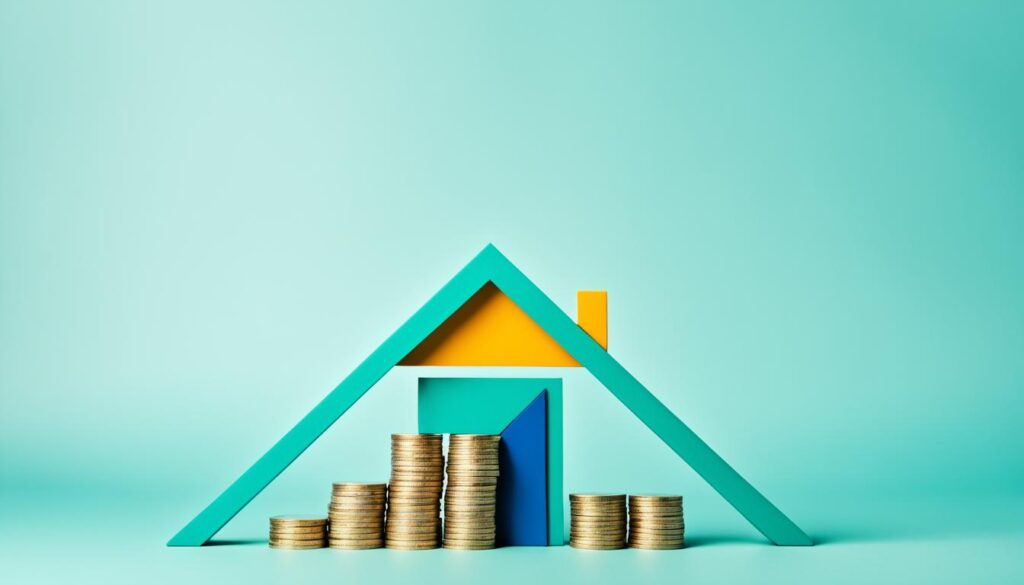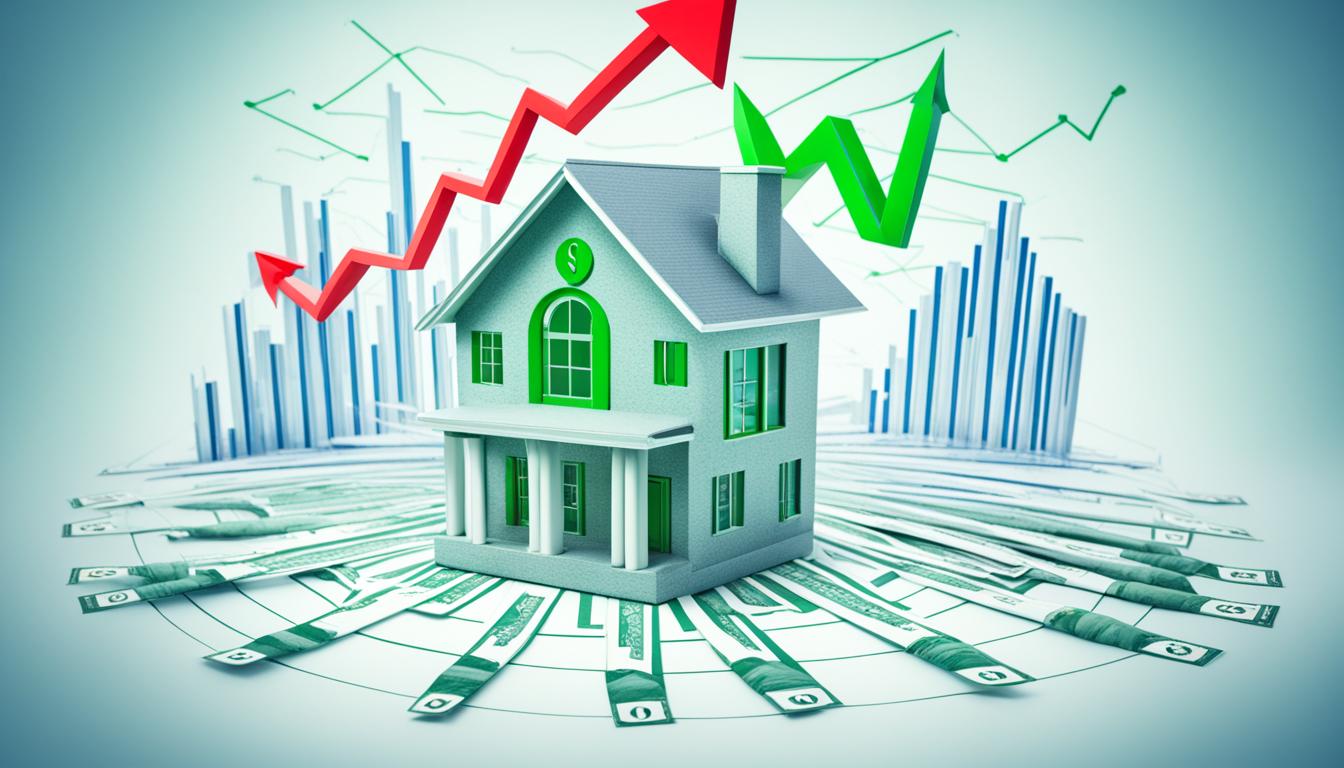Refinancing your mortgage can save you lots of money. By getting a lower interest rate, you could save thousands. This also means you might pay less each month on your mortgage. You could use this extra cash to pay off other debts, save more, or add to your retirement fund.
When you refinance, you might also be able to pay off your home loan faster. This is because you could get a shorter loan term. Plus, if you currently have an adjustable rate mortgage, switching to a fixed rate can protect you from the effects of rising interest rates.
Another plus of refinancing is to access your home’s equity through a cash-out option. This extra money can go into home upgrades, paying off debts, or funding big needs like education or medical bills. Refinancing might even help you get rid of private mortgage insurance (PMI) if you owe less than 80% of your home’s value.
In short, refinancing can put more money in your pocket and make things less tight for your budget.
Key Takeaways:
- Refinancing a mortgage can save homeowners thousands of dollars by securing a lower interest rate.
- Reduced monthly mortgage payments enable borrowers to allocate funds towards other financial goals.
- Shortening the loan term through refinancing can lead to reduced interest expenses and faster mortgage payoff.
- Refinancing to a fixed interest rate provides stability by protecting against interest rate fluctuations.
- A cash-out refinance allows homeowners to tap into home equity for various purposes.
Lower Interest Rate
Refinancing a mortgage to a lower rate is a big win. It saves money on interest over the loan’s life. These savings can add up to thousands of dollars over time.
A lower rate also means paying less each month. This extra cash can be used to tackle debt or save money. It opens the door to better financial choices.
With a lower rate, there’s more money for other goals too. This could be investing, saving for retirement, or making a dream come true. A smaller mortgage payment can be a game-changer for homeowners.
Refinancing brings savings on interest. It lowers the monthly mortgage too. This means more money to pay off debts.
Example Scenario: Interest Savings
Let’s look at a scenario to see the impact of a 1% rate drop:
| Original Mortgage | Refinanced Mortgage | |
|---|---|---|
| Loan Amount | $200,000 | $200,000 |
| Interest Rate | 4% | 3% |
| Loan Term | 30 years | 30 years |
| Total Interest Paid | $143,739 | $103,601 |
By getting the rate down 1%, the borrower saves about $40,138 on interest. This money can go towards saving, investing, or clearing debt.
Refinancing for a lower rate can really change your financial future. It’s a smart move for many homeowners.
Shortened Loan Term
Refinancing a mortgage can help you cut down your loan term. This lets you reach your mortgage pay off faster. If you’ve made payments on a 30-year loan for some years, switching to a 20-year one might be possible. You won’t see a big change in your monthly payment.
Having a shorter loan term means paying less interest over time. Even if your monthly payment goes up a little, you’ll save a lot on interest. This way, you pay off your home more quickly and own more of it sooner.
Imagine this scenario:
| Loan Details | 30-Year Loan | 20-Year Loan |
|---|---|---|
| Loan Amount | $250,000 | $250,000 |
| Interest Rate | 4% | 3.5% |
| Loan Term | 30 years | 20 years |
| Monthly Payment | $1,193.54 | $1,568.12 |
| Total Interest Paid | $179,674.72 | $94,948.80 |
In this case, moving from a 30-year loan to a 20-year one, the monthly payment goes up. Yet, the loan term being shorter means saving a lot in interest. By switching to a 20-year loan, you’d save about $84,725.92 on interest. This shows why shortening your loan term through refinancing is a good idea.
Also, paying off the house sooner lets you build up equity faster. This gives you more financial room. You might use this equity for future home upgrades or to help with education costs.
When you refinance to a shorter loan term, you save money on interest. You also get to pay off your mortgage quicker and own more of your home sooner.
Fixed Interest Rate
People with adjustable rate mortgages sometimes switch to a fixed interest rate. With ARMs, your interests can change, making your payments higher. Refinancing to a fixed rate can keep your payments steady, making your budgeting easier.
It also provides a buffer against future interest rate hikes. This way, homeowners won’t stress about rising costs.
Benefits of a Fixed Interest Rate:
- Stability in monthly mortgage payments
- Predictability in long-term interest expenses
- Protection against interest rate fluctuations
- Peace of mind for homeowners
Refinancing locks your monthly mortgage payments at a set amount. So, you won’t fret about sudden rate changes. This gives you financial peace.
A fixed rate helps you make long-term plans. Solo, you always know what you’ll pay each month. This lets you focus on other financial goals.

Cash-Out Refinance
When homeowners have a lot of home equity, a cash-out refinance might help. It lets them refinance their mortgage and get a lump sum payout. This money can be used for many things that fit their financial plans.
A cash-out refinance helps with home improvements or repairs. Owners can make their house better. They can upgrade the kitchen, add bedrooms, or improve the heating. This makes their dream home a reality.
| Benefits of Cash-Out Refinance | Common Uses of Funds |
|---|---|
| Tap into home equity | Financing home improvements |
| Receive a lump sum payout | Consolidating debt |
| Covering large expenses like medical bills or college tuition |
Homeowners can also use the money to pay off high-interest debts. This includes credit cards or personal loans. Getting rid of these debts can make life less stressful and save money on interest.
A cash-out refinance is handy for big, unexpected costs. This could be medical bills or legal fees. It gives homeowners a financial safety net, reducing stress.
A cash-out refinance turns a home into more than a place to live. Homeowners can use their home equity wisely. They might invest in something big, pay off debt, or handle sudden costs.

A cash-out refinance lets homeowners use their home’s value for financial needs.
Elimination of Private Mortgage Insurance (PMI)
Refinancing your mortgage could let you stop paying for private mortgage insurance (PMI). This is usually the case when you’ve paid 80% or more of your house’s value. Yet, with refinancing, you might not need PMI if your home’s value has gone up or you’ve paid down a big part of your loan.
Getting rid of PMI means you pay less every month, helping your finances a lot. This is great news for those whose homes are worth more now or have paid much of their loan off already.

How Does It Work?
PMI is like a safety net for the lender if you fail to pay your mortgage. Usually, if you don’t have at least 20% equity in your house, you’ll need to pay for PMI. This makes your monthly mortgage cost go up a bit.
Yet, if your equity crosses the 20% mark due to a lower loan amount or higher home value, you can say goodbye to PMI. You might need an updated home appraisal to show your home’s current value. If the numbers prove you’re at or below 80% LTV, refinancing can get rid of PMI and cut your monthly costs.
Benefits of Removing PMI
Getting rid of PMI with a refinance has many pluses for homeowners:
- Less Money Every Month: Without PMI, you’d pay a lot less towards your mortgage each month. This means more money in your pocket for saving or spending.
- More Savings: By paying less each month, you save more in the long run. You can put this saved money into an emergency fund, retirement, or new investments.
- Financial Health Boost: Lowering your homeownership costs means better financial health. You can manage your money better, meeting other financial goals more easily.
Considerations Before Refinancing to Remove PMI
Even though ditching PMI with a refinance sounds good, there are things to think about:
- Refinancing Expenses: Look at the costs of refinancing, like closing fees. Make sure the money you save from no PMI is more than the cost of refinancing.
- Interest Rates: Check interest rates from various lenders before you refinance. Make sure the new rate is good and doesn’t increase your costs.
- Future Plans: Think about your long-term financial goals. If you’re selling soon, make sure the savings from no PMI make the refinance worth it.
Pros of Refinancing
Refinancing your mortgage can offer major advantages. It can boost your finances and help you reach your goals sooner. Here are the top benefits:
1. Lower Interest Rate
Getting a lower interest rate is a big win of refinancing. It means you could save a lot on interest over your loan’s life. Lower rates cut down monthly payments too. This frees up money to use elsewhere or save. In the long run, you save a big chunk of cash.
2. Reduced Monthly Payment
Refinancing can also slash your monthly mortgage costs. This happens by getting a lower rate or extending your loan term. Lower payments mean more money in your pocket. You can use this extra cash for other needs or savings. It helps you manage your money better and stay stable financially.
3. Cash-Out Refinance
If you’ve built equity in your home, a cash-out refinance might be a good option. It allows you to refinance for more than you owe and take the extra as cash. This money can be used for way important things like improving your home, paying off debts, or big bills like tuition. It lets you use your home’s value for key financial goals.
4. Elimination of PMI
PMI is needed when your LTV is over 80%. But, refinancing can get rid of PMI if your LTV drops below 80%. This means lower monthly payments and better financial standing. Not having to pay PMI saves a lot and gives you financial wiggle room.
| Benefits of Refinancing | |
|---|---|
| Lower Interest Rate | Save money on interest payments and reduce monthly mortgage payments |
| Reduced Monthly Payment | Free up funds for other financial priorities or increase savings |
| Cash-Out Refinance | Access home equity for important expenses or investments |
| Elimination of PMI | Save money on monthly mortgage payments by removing PMI requirement |
In total, refinancing can bring you big financial wins. From lower interest rates to reducing payments, accessing home equity and removing PMI, it helps with your finances. It’s a smart way to reach your financial goals faster.

Cons of Refinancing
Refinancing your mortgage has benefits but also some downsides. One big negative is the closing costs. These can change based on where you live, your home’s value, and your loan size. These costs include appraisal and credit report fees, along with other services.
Refinancing might also increase your debt if you don’t spend the money wisely. It’s vital to think about how you’ll use the extra cash. Make sure it fits your long-term financial plans. If you don’t plan well, you could end up with more debt and a longer time to pay it off.
Another issue is that your credit score might drop temporarily. This happens because lenders check your credit hard. It’s a short-lived effect, but be ready for it.
Managing the Cons Effectively
“Understanding the potential cons of refinancing can help. Consider the closing costs, extra debt risk, and credit score change. Look at closing costs from different lenders to get the best deal. Use the money smartly, and stick to your important financial goals.
Lastly, keep an eye on your credit. Try to improve it after refinancing to lessen any bad effects.” – Financial Expert
Comparison of Closing Costs
| Lender | Appraisal Fees | Credit Report Fees | Title Services | Lender Origination and Administration Fees | Survey Fees | Underwriting Fees | Attorney Costs |
|---|---|---|---|---|---|---|---|
| Lender A | $300 | $50 | $500 | $1,000 | $0 | $500 | $500 |
| Lender B | $350 | $75 | $600 | $900 | $0 | $600 | $600 |
| Lender C | $400 | $100 | $700 | $800 | $0 | $700 | $700 |
Table: Comparison of closing costs from different lenders. The costs may vary depending on the lender and loan terms.
In the end, there are downsides to refinancing, but you can lessen the impact. Do your homework on closing costs and manage your money wisely. Also, keep an eye on your credit. This way, refinancing can still be a good choice for your future.
Building Savings as an Alternative
Instead of refinancing, homeowners can build savings. They should focus on saving money for emergencies. This method is better than just counting on home equity. Saving and building reserves helps create a financial safety net.
It is important to save for the future to avoid financial pitfalls. Emergency savings can cover sudden costs like medical bills or car repairs. This way, homeowners won’t need to refinance their homes.
Saving brings peace of mind. It means being ready for any financial surprise. Homeowners can also plan for big future expenses like retirement or buying a new house.
Saving is a long-term effort. Regularly putting money aside can lead to big savings over time. Making savings automatic is a smart way to build good money habits.
Homeowners should look into high-interest savings options. Accounts with better rates or CDs can help savings grow quicker. This means more security for the future.
Key Benefits of Building Savings:
- Protection against unexpected emergencies
- Peace of mind and financial stability
- Ability to pursue other major financial goals
- Long-term financial security
Building savings is a key step towards financial security. It’s better than relying only on home refinance. Emergency savings keep homeowners safe from sudden financial problems without risking their future.
Conclusion
In conclusion, refinancing your mortgage can benefit you in many ways. You can lock in a lower interest rate, saving a lot on interest. If you find a better rate, you might lower what you pay each month. This can give you more money for other things you need.
By refinancing, you might also pay off your mortgage sooner. This means saving a lot of money on interest in the long run. It can help you reach your mortgage payoff goals and grow your home equity.
If you have an adjustable rate mortgage (ARM), refinancing to a fixed rate can be smart. A fixed rate gives you stable payments and protects you from rate increases. It also lets you turn some of your home equity into cash. You can spend this cash on your home, paying off debts, or big expenses like medical bills or college.
If your loan-to-value ratio is now less than 80%, you might not have to pay private mortgage insurance (PMI) anymore. This could slash your monthly payments. It means more money in your pocket every month. Overall, refinancing can mean saving a lot, more flexibility, and a stronger financial future. It is a move worth thinking about for your financial health.
FAQ
What are the benefits of refinancing a mortgage?
Refinancing can save you a lot of money by getting a lower interest rate. This can lower your monthly mortgage payment. You can then use the extra money for other things like paying off debts or saving more.
It also lets you pay off your mortgage faster if you choose a shorter loan term. If you have an adjustable rate, refinancing to a fixed rate can protect you from rate hikes. You can even get cash from your home equity to use for big costs.
Plus, if your home is worth more, you might not have to pay private mortgage insurance. So, refinancing has big financial benefits for you.
How does securing a lower interest rate benefit homeowners?
Refinancing to a lower rate can save you a lot on interest throughout your loan. It could mean thousands in savings over time. A lower rate also cuts your monthly payment.
This frees up money you were spending on your mortgage. You can use this to pay off debt, making your financial situation better.
How can refinancing help homeowners shorten the term of their loan?
Refinancing can let you choose a shorter loan term without a big change in your monthly payment. This way, you pay less interest over time. But you build up your equity faster.
Though you might pay slightly more each month, you save a lot in interest. This helps you pay off your loan quicker.
How does refinancing to a fixed interest rate protect homeowners from interest rate fluctuations?
If you have an adjustable rate now, switching to a fixed rate can be a good move. This keeps your rate the same over the loan’s life. You won’t face sudden increases in your monthly payment due to rate changes.
Having a fixed rate makes your mortgage cost predictable. So, you can plan your budget better without worrying about rate changes.
How does a cash-out refinance allow homeowners to tap into home equity?
A cash-out refinance lets you use your home’s equity by getting a loan for more than you owe. You get cash that can be used in different ways. This includes home improvements, paying off debts, or covering big expenses.
It’s taking money out on what you already own. But consider the future value of your home when you take this option.
How does refinancing help homeowners eliminate private mortgage insurance (PMI)?
Refinancing can remove the need for private mortgage insurance if you’ve paid down your loan or if your home’s value has increased. This can lower your monthly payment. Removing PMI saves you money and improves your financial situation.
What are the pros of refinancing a mortgage?
Refinancing comes with a lot of good points. It can lower your interest rate and your mortgage payment, saving you money. You can even shorten your loan term to pay it off faster.
Switching from an adjustable rate to a fixed rate offers peace of mind. Plus, you can get cash from your home for major expenses. Refinancing also helps in removing the need for PMI if you qualify. It’s a strong move for your finances.
What are the cons of refinancing a mortgage?
Refinancing isn’t without challenges. There are closing costs to consider that can be high. These include appraisal, credit check, and legal fees.
It might also add more debt if you’re not careful. Plus, the application process can slightly lower your credit score. But these are usually short-term issues.
Is there an alternative to refinancing a mortgage?
Instead of refinancing, working on your savings is another option. It’s wise to have money set aside for unexpected costs. Having an emergency fund gives you financial security without the need to refinance.
It’s a smart way to be ready for the future. By saving up, you avoid the challenges that come with refinancing.
What are the benefits of refinancing a mortgage?
Refinancing can save you a lot of money over time with a lower interest rate. This means lower monthly payments and more money in your pocket. You can even cut down on your loan term and pay less in interest.
For those with adjustable rates, moving to fixed rates offers stability. You can also get cash from your home’s value to use how you need. And, if you qualify, you might not have to pay PMI anymore.
Refinancing does a lot to better your financial situation.


















